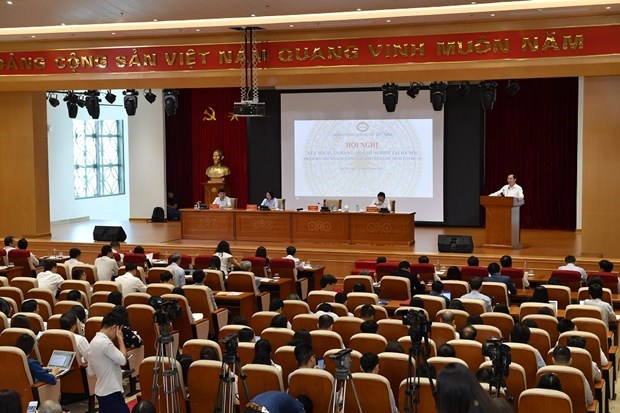Banking sector works to support firms affected by COVID-19
 Transactions at a bank (Photo: VietnamPlus)
Transactions at a bank (Photo: VietnamPlus)
Hanoi (VNA) - Credit institutions need to balance their capital to effectively invest in projects, which are now able to recover following the control of the COVID-19 pandemic, said Deputy Governor of the State Bank of Vietnam (SBV) Dao Minh Tu.
At a conference held by the SBV in Hanoi May 14, representatives from enterprises highly appreciated efforts made by the banking sector, especially the central bank, in supporting those affected by the COVID-19 pandemic.
The issuance of Circular No.1 on rescheduling repayment periods and waiving reducing interest rates to support enterprises and people affected by the pandemic is a practical and timely policy, they said.
However, many businesses said that it is difficult to access this support because of complicated procedures.
According to SBV Deputy Governor Dao Minh Tu, the COVID-19 pandemic has impacted all aspects of the economy, society and people's lives.
Under the Government’s drastic and timely direction and operation, the central bank proactively made forecasts and taken urgent solutions to remove difficulties facing businesses and people in production and business activities, he stated.
Tu said the central bank issued Circular No.1 and Directive No.2 in early March, which stipulate that credit institutions can reschedule outstanding debts, including principals and interests that arise from lending, reducing and exempting interest rates and fees, and providing new loans to projects and businesses that need capital to maintain and recover their operation amid the pandemic.
With three chapters and 10 articles, the circular features a number of important items related to the scope of restructuring repayment and criteria for determining loans affected by the disease.
Debts subject to rescheduling are the outstanding amounts of principal and/or interest, including balances of debts subject to the Government's Decree No. 55/2015/ND-CP dated June 9, 2015 on credit policies for agricultural and rural development as amended and supplemented, that fully satisfy the following conditions: arising from lending activities, financial leasing; the obligation to repay the principals and/or interest arising between January 23, 2020 and the day after three months from the date the Prime Minister announces the end of the COIVID-19 epidemic.
Credit institutions are entitled to maintain the classified debt groups in accordance with the provisions of the SBV at the closest time to January 23, 2020, with regard to the debt balances subject to loan repayment rescheduling, interest and fee waiver and reduction as prescribed in this circular.
They are requested to conduct debt classification and set up risk provisions in line with the restructured terms in accordance with legal provisions on debt classification, setting up and using risk provisions in order to address risks in the operation of credit institutions and foreign banks' branches. However, the adjustment principles shall not be applied to debt groups with higher risk levels.
 At the conference (Photo: the State Bank of Vietnam)
At the conference (Photo: the State Bank of Vietnam)
Tu said after two months of drastic implementation, all credit institutions, including finance companies and foreign banks, strongly joined their hands, contributing to supporting their customers to overcome difficulties and resume production and business.
Credit institutions have so far restructured payment periods for over 215,000 borrowers with total outstanding loans of 130 trillion VND and reduced interest rates for 260,000 borrowers with total outstanding loans of 1.08 quadrillion VND. They also provided new loans worth 630 trillion VND for 182,000 customers with interest rates 0.5-2.5 percent per year lower than the pre-pandemic period.
Notably, the Vietnam Bank for Social Policies extended debt repayment periods for nearly 103,000 borrowers with a total of outstanding loans of over 2.8 trillion VND and provided new loans totaling nearly 19 trillion VND to nearly 517,000 customers.
According to Mac Quoc Anh, Vice Chairman of the Hanoi Association of Small and Medium-sized Enterprises (SMEs) said the association has regularly coordinated with the SBV’s Hanoi chapter to organise meetings with SMEs, aiming to discuss measures to help them address credit-related difficulties.
It has also worked with banks such as SHB, TPBank, VietinBank Hoang Mai, Vietcombank, Agribank, and Military Bank to support enterprises in building feasible plans to access loans, he added./.













